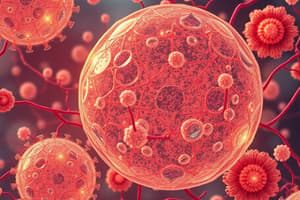Podcast
Questions and Answers
Membrane transport refers to the regulation of the passage of solutes through biological membranes.
Membrane transport refers to the regulation of the passage of solutes through biological membranes.
True (A)
The selective membrane permeability of biological membranes allows them to separate substances of distinct chemical nature.
The selective membrane permeability of biological membranes allows them to separate substances of distinct chemical nature.
True (A)
The movements of most solutes through the membrane are mediated by lipid bilayers.
The movements of most solutes through the membrane are mediated by lipid bilayers.
False (B)
There is a group of specific transport proteins for each cell type and for every specific physiological stage.
There is a group of specific transport proteins for each cell type and for every specific physiological stage.
The regulation of the transport proteins is only controlled at the genetic-molecular level.
The regulation of the transport proteins is only controlled at the genetic-molecular level.
Membrane transport proteins are not specialized in the transport of specific molecules
Membrane transport proteins are not specialized in the transport of specific molecules
The regulation of passage through the membrane is not due to selective membrane permeability
The regulation of passage through the membrane is not due to selective membrane permeability
The differential expression of transport proteins is only regulated at the genetic-molecular level
The differential expression of transport proteins is only regulated at the genetic-molecular level
The movements of most solutes through the membrane are not mediated by membrane transport proteins
The movements of most solutes through the membrane are not mediated by membrane transport proteins
The cell membrane does not regulate the transport of materials entering and exiting the cell
The cell membrane does not regulate the transport of materials entering and exiting the cell
Flashcards are hidden until you start studying
Study Notes
Membrane Transport
- Membrane transport refers to the regulation of the passage of solutes through biological membranes.
- Biological membranes separate substances of distinct chemical nature due to their selective membrane permeability.
- Lipid bilayers mediate the movements of most solutes through the membrane.
- There are specific transport proteins for each cell type and for every specific physiological stage.
- The regulation of transport proteins is controlled at the genetic-molecular level.
- Membrane transport proteins are not specialized in the transport of specific molecules.
Corrections
- It is not true that the regulation of transport proteins is only controlled at the genetic-molecular level.
- Selective membrane permeability does play a role in the regulation of passage through the membrane.
- The differential expression of transport proteins is not only regulated at the genetic-molecular level.
- Membrane transport proteins do mediate the movements of solutes through the membrane.
- The cell membrane does regulate the transport of materials entering and exiting the cell.
Studying That Suits You
Use AI to generate personalized quizzes and flashcards to suit your learning preferences.




